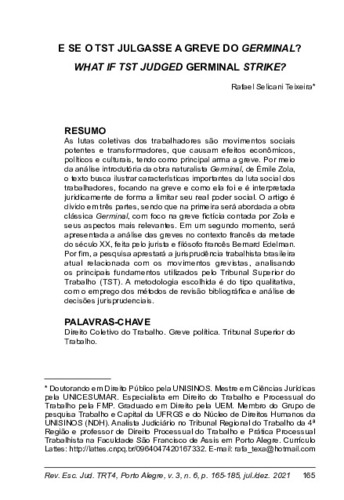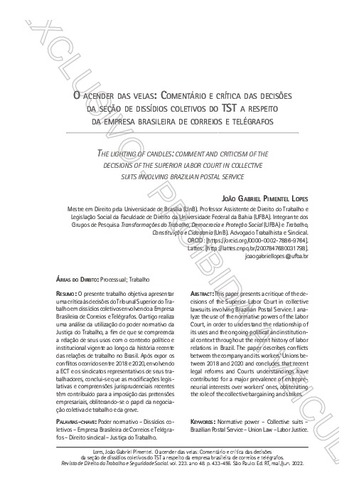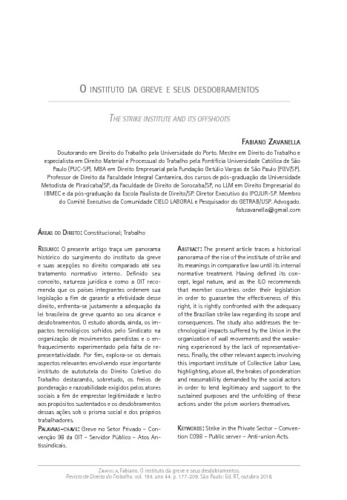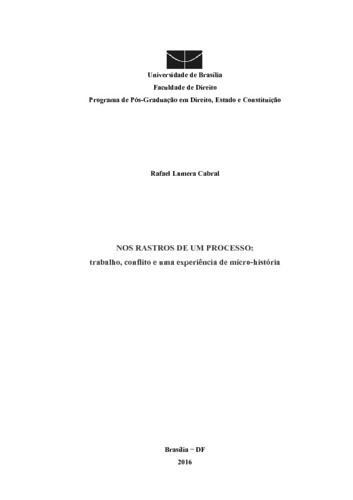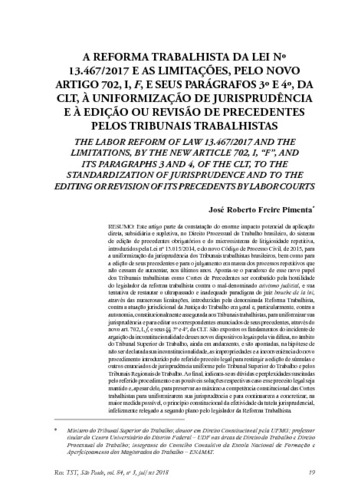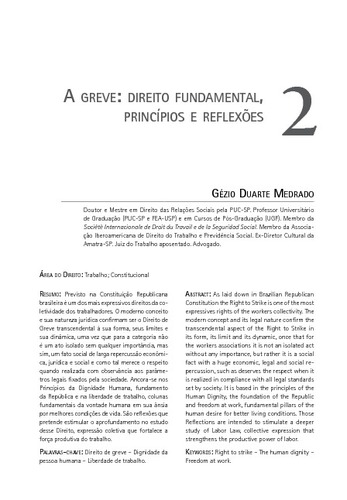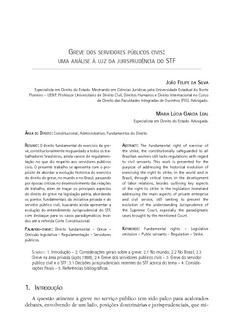Artigo de periódico
A reforma trabalhista como uma pauta não trabalhista?: a greve geral de 2017 e o Tribunal Superior do Trabalho
| dc.contributor.author | Valentim, Gabriel Lima | |
| dc.date.accessioned | 2024-06-25T16:06:24Z | |
| dc.date.available | 2024-06-25T16:06:24Z | |
| dc.date.issued | 2022-12 | |
| dc.identifier.citation | VALENTIM, Gabriel Lima. A reforma trabalhista como uma pauta não trabalhista?: a greve geral de 2017 e o Tribunal Superior do Trabalho = The labor reform as a non-labor agenda?: the 2017 general strike and the Superior Labor Court. Revista da Escola Judicial do TRT4, Porto Alegre, v. 4, n. 7/8, p. 175-201, jan./dez. 2022. | pt_BR |
| dc.identifier.uri | https://hdl.handle.net/20.500.12178/234720 | |
| dc.description.abstract | [por] Realiza uma análise crítico-construtiva das decisões judiciais do Tribunal Superior do Trabalho (TST) que declararam a greve geral de 2017 como abusiva. A Constituição de 1988, de forma progressista e inovadora, garantiu aos trabalhadores o direito de greve, estabelecendo expressamente a liberdade reivindicativa nesse movimento. Todavia, o TST vem, desde a greve dos petroleiros de 1995, declarando greves políticas como abusivas. Emerge, então, a indagação principal que surge deste trabalho: seriam essas declarações de abusividade constitucionais? O artigo investiga o caso da greve geral de 2017 como um paradigma para responder a essa pergunta. O trabalho tem como base a pesquisa bibliográfica e documental, com objetivos exploratório e explicativo, valendo-se da utilização do método hipotético-dedutivo e de estudos de caso. O artigo chegou a três conclusões principais: o conceito de greve política é raso, visto que toda greve tem um componente político; mesmo levando em conta o frágil conceito de greve política, a greve geral de 2017 contra a reforma trabalhista não se enquadraria nesse conceito, já que a reforma claramente afeta as condições profissionais dos grevistas; por fim, as decisões do TST sobre a abusividade de greves políticas ignoram a forte influência do empresariado na tomada das decisões do Estado. A decisão afronta o que foi claramente escolhido pelos constituintes de 1987 – o direito à liberdade reivindicativa dos trabalhadores. | pt_BR |
| dc.description.abstract | [eng] The present study aims to carry out a critical-constructive analysis of the Superior Labor Court’s judicial decisions that declared the 2017 general strike as abusive. The 1988 Constitution, in a progressive and innovative way, guaranteed workers the right to strike, expressly establishing the freedom of claims in this movement. However, the Superior Labor Court has, since the 1995 oil strike, declared "political strikes" abusive. Then, the main question that arises from this work is: would these declarations of abusiveness be constitutional? The article investigates the case of the 2017 general strike as a paradigm to answer this question. The work is based on bibliographic and documental research, with exploratory and explanatory objectives, using the hypothetical-deductive method and case studies. The article reached three main conclusions: the concept of political strike is shallow, since every strike has a political component; even considering the fragile concept of a political strike, the 2017 general strike against the Labor Reform would not fit into this concept, as the Reform clearly affects the professional conditions of the strikers and, finally, the Superior Labor Court’s decisions on the abusiveness of workers’ political strikes ignore the strong influence of employers on state decision-making. The decision affronts what was clearly chosen by the 1987 constituents, the workers’ right to freedom of claim. | pt_BR |
| dc.description.tableofcontents | O que é uma greve política? A questão conceitual no direito de greve -- A greve geral de 2017 contra as reformas trabalhista e da previdência: Os julgamentos do Tribunal Superior do Trabalho: greve contra uma reforma não trabalhista? | pt_BR |
| dc.language.iso | pt_BR | pt_BR |
| dc.relation | Brasil. Lei n. 13.467, de 13 de julho de 2017 | pt_BR |
| dc.relation.ispartof | Revista da Escola Judicial do TRT4: vol. 4, n. 7/8 (jan./dez. 2022) | pt_BR |
| dc.relation.uri | https://www.lexml.gov.br/urn/urn:lex:br:federal:lei:2017-07-13;13467 | pt_BR |
| dc.subject | Brasil. Lei n. 13.467, de 13 de julho de 2017 | pt_BR |
| dc.subject | Brasil. Tribunal Superior do Trabalho (TST), decisão judicial | pt_BR |
| dc.subject | Greve, Brasil | pt_BR |
| dc.subject | Greve, aspectos políticos, Brasil | pt_BR |
| dc.subject | Direito de greve, Brasil | pt_BR |
| dc.subject | Reforma trabalhista, Brasil | pt_BR |
| dc.title | A reforma trabalhista como uma pauta não trabalhista?: a greve geral de 2017 e o Tribunal Superior do Trabalho | pt_BR |
| dc.title.alternative | The labor reform as a non-labor agenda?: the 2017 general strike and the Superior Labor Court | pt_BR |
| dc.type.genre | Artigo de periódico | pt_BR |
| dc.identifier.rvbisys | 001262362 | |
| dc.relation.ispartoflink | https://hdl.handle.net/20.500.12178/228536 | pt_BR |
Coleção
-
Artigos9497




